Today’s “The Future of Humanoids” panel for Comic-Con@Home featured the creative voices behind many of the publisher’s top titles. Moderated by Karama Horne, aka The Blerd Gurl, the panelists included publisher Mark Waid, Omni writer Melody Cooper, the MPLS Sound creative team of Joseph P. Illidge and Meredith Laxton, and writer/artist Ibrahim Moustafa.
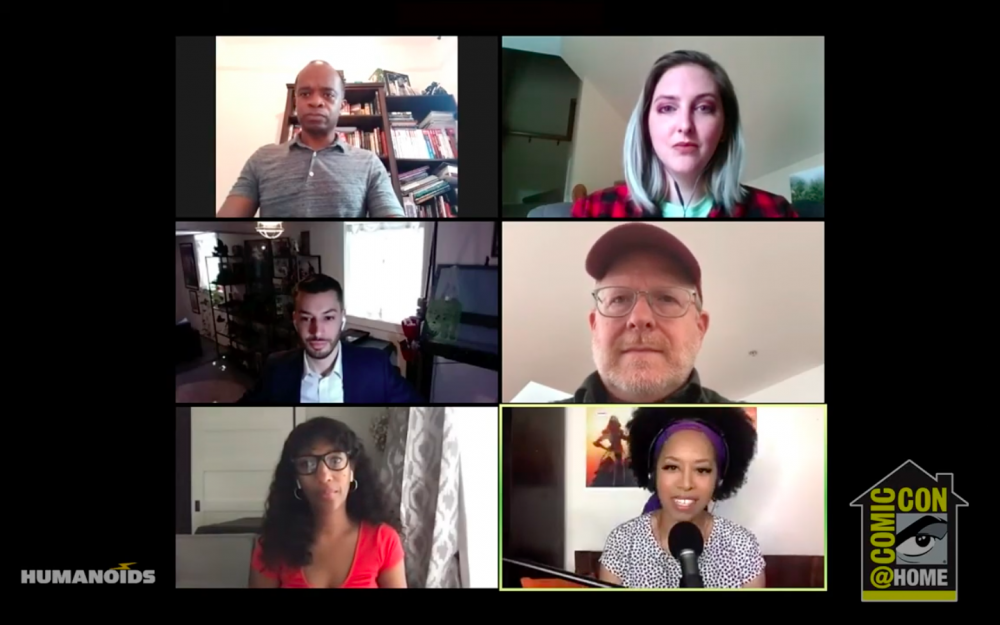
Horne kicked off the panel by introducing the panelists and quickly running down their impressive CVs. Following introductions, Horne talked about Humanoid’s history in Europe, and asked how the “Humanoids ethos” applies in the United States. Waid said there’s a large market for non-superhero comics in the U.S., and that Humanoids, along with many other publishers, offers a variety of different genres that are non-superhero-based.
Regarding the H1 and Life Drawn imprints, Waid said the former was an attempt for Humanoids to break into the U.S. mainstream with fictional stories, while the latter imprint features non-fiction stories including biographies and autobiographies. He said the publisher plans to hold on launching any other new imprints until they’re sure they’ve gotten the two preexisting imprints “right.”
Asked about drawing stories from real life for the H1 imprint, Waid said they would continue to do that. “If you have the ability, you have the responsibility,” he said, describing Humanoids as a conduit for voices who can address real-world issues. Cooper said that her writing is based in social issues, and that she’s been able to bring that to Omni and the character of Cecilia. Horne called Cecilia one of her favorite characters, and Cooper, who took over Omni from Devin Grayson, described Cecilia’s powers as “hyper-awareness” and an ability to make deductions quickly based on a spectrum of nine cognitive modalities.
Moving into MPLS Sound, Illidge talked about the graphic novel’s main character, Theresa Booker, “a black woman who tries to create a funk & soul band in the early ‘80s in Minneapolis,” and how a meeting with Prince catalyzed her to start the band. Illidge credited former editor Fabrice Sapolsky for introducing him to the world of Minneapolis music. Laxton described drawing real-world characters as “daunting,” but said she’s “learned a lot” while working on the book. Asked about their collaborative process, Illidge said they had “a nucleus of an idea” that he was brought in to fill out, and that he and Laxton met before he completed the script. He said he asked Laxton what she liked to draw so he could write to her strengths, and praised her ability to render the real places and people who are part of the story, as well as the body diversity on display in the story.
Moustafa next talked about The Count, his recently-announced reimagining of The Count of Monte Cristo. He said he’s a fan of stories about revenge and retribution, but that he wanted to tell the story in a more updated setting to make it more accessible. Describing the book as “Count of Monte Cristo meets sci-fi”, Moustafa said the story follows a courier who is wrongfully imprisoned, and who sets out for revenge after getting free, only to find his home in the middle of a civil war between the different classes in the city. He described the original story as more of a soap opera than an action story, and that he’s bringing more action into the narrative while using “the framework of the original.” On whether he prefers writing or drawing, Moustafa said he’s found the writing aspect of The Count to be “harder than I anticipated,” but that the art side still takes the lions-share of the work when it comes to putting together a comic.
Horne asked what it’s been like to work on comics while so much is happening in the world outside, between the pandemic and the Black Lives Matter movement. Cooper said her position is unique, as she is the person who posted the video of her brother, Christian Cooper, being harassed in Central Park. She said they’re both activists, and that “weaponized racism” hitting so close to home took her aback at first, but ultimately solidified the importance of addressing social issues through art, but that it takes time to let things “percolate.”
Waid agreed that it’s important to take time with telling these stories, and that the nature of the medium means that it takes time to tell these stories anyway due to how long it takes to produce a book and get it onto shelves. He said there’s a risk involved in being three months behind at any time as a result of the periodical business. He also reiterated what Cooper said about comics working better as allegory than as depiction of specific incidents, saying an upcoming issue of Ignited will deal with the Trayvon Martin case without specifically saying so. Waid expressed his excitement at how organized and mobilized America’s youth have been this year, and said “that gives me hope for the future,” with Cooper adding her astonishment that the movement has gone global as well.
Horne brought up distribution models for comics, and Waid said Humanoids is looking at new models going forward. He said he’s been pushing digital comics for a decade, and that he’s learned in that time that print comics and graphic novels “are not going away.” He said the important thing is being able to get their messages out.
On the subject of diversity, Waid said it’s important to not “just be a bunch of old white guys telling stories.” He joked about the length of his career in comics, and said he’s tired of hearing white guys talk about what they want to do in comics. He said an effort was made with the H1 imprint to bring in marginalized voices, and that Humanoids will continue to do that going forward. Aside from it being a way to reach the audience, Waid said, it’s also “the right thing to do.”
Noting that Waid, their boss, is in the room, Horne asked the other panelists how they feel about the level of creative freedom they’ve had in working with Humanoids, and how it compares to working for other publishers. Moustafa said he feels lucky as someone who both writes and draws his work, and that he’s been able to use The Count as a way to work through his feelings given current events, and that he feels very supported in that.
Laxton said she went from video games to comics – “one male-dominated industry to another” – and that she’s felt very supported in comics, specifically praising Sapolsky for bringing her in. Illidge said he thinks MPLS Sound is not a book other publishers would want to put out, and that, as a book about a black woman facing off against a system, it’s a story that will be applicable for years. “These stories are the fight for the dream,” he said, and praised Humanoids for bringing those stories together.
Cooper agreed, and said she’s grateful for the opportunity to work on Omni and voice her concerns. She described comics as unique compared to television or film, and that she’s felt very supported and trusted since coming to Humanoids. Waid said he was glad to hear everyone felt this way, but also said that it’s his job to be as supportive as possible.
Asked what he’s looking forward to from Humanoids through the end of the year, Waid said they’re going to come back from the shutdown strong, and that they have “other things in development that are specifically done with a mind toward inclusivity” and giving marginalized voices an opportunity to tell their stories.
Miss any of our other SDCC 2020 coverage? Click here for much more!


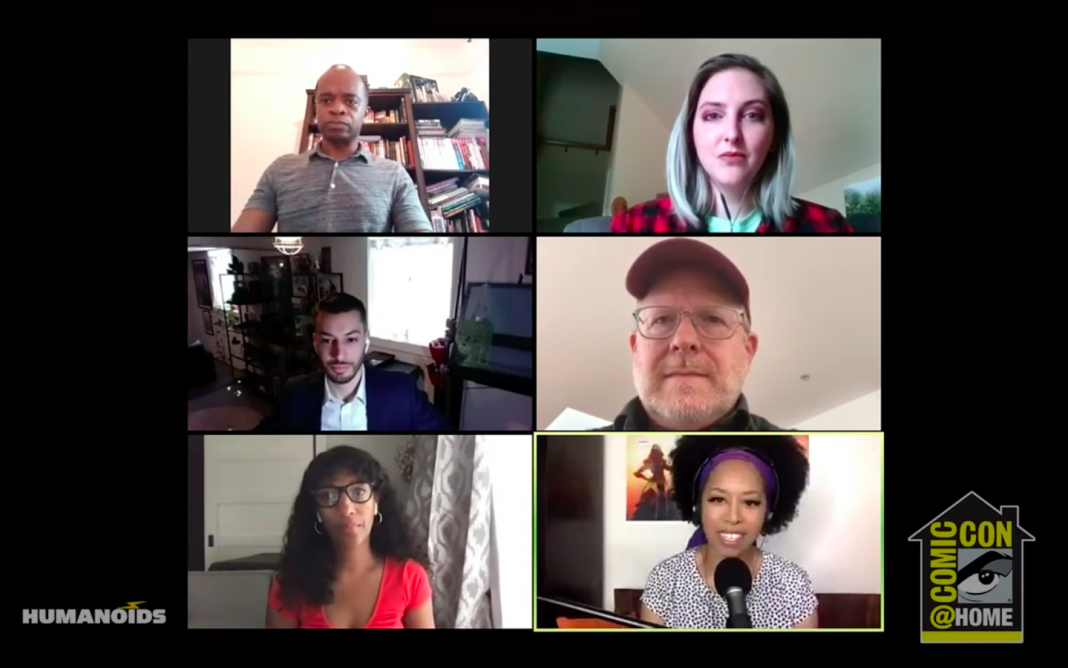
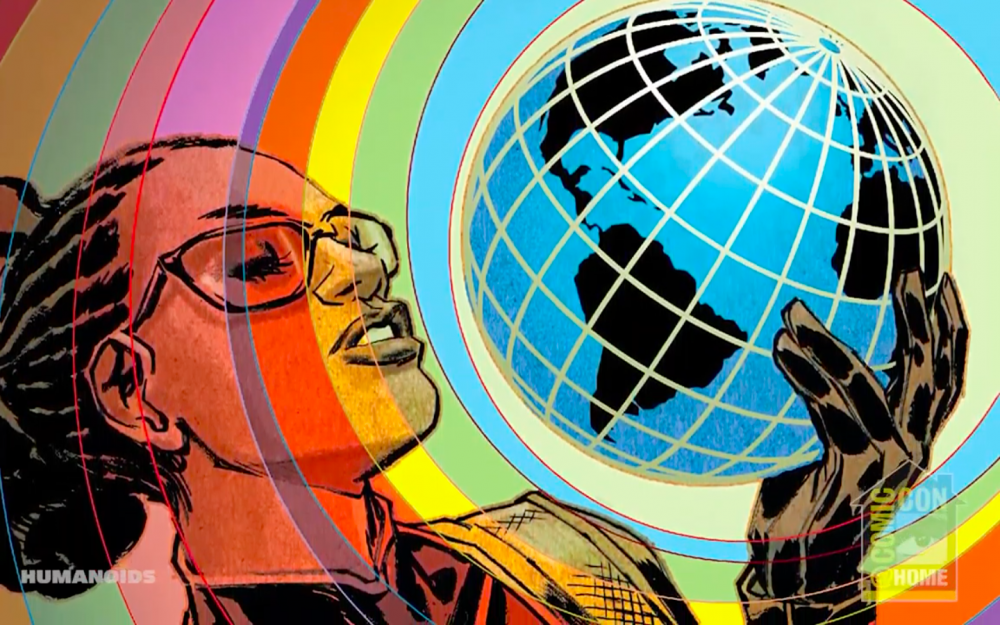
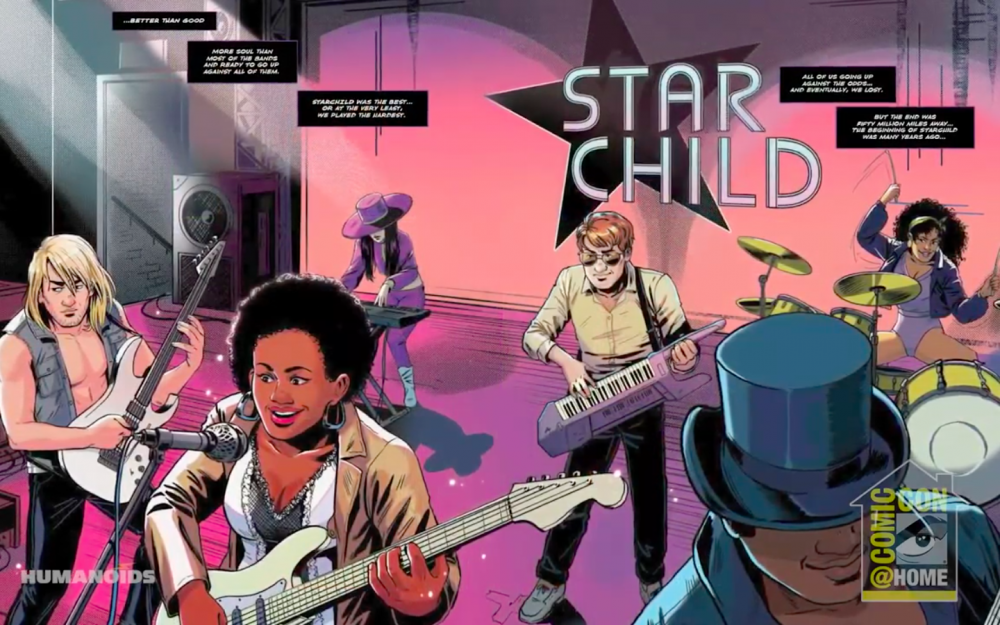
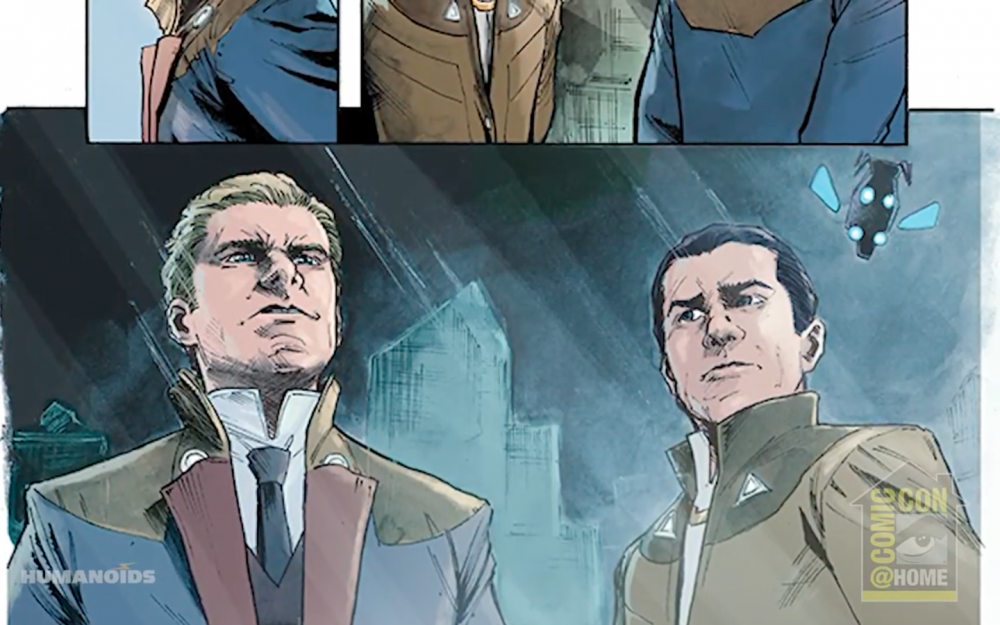
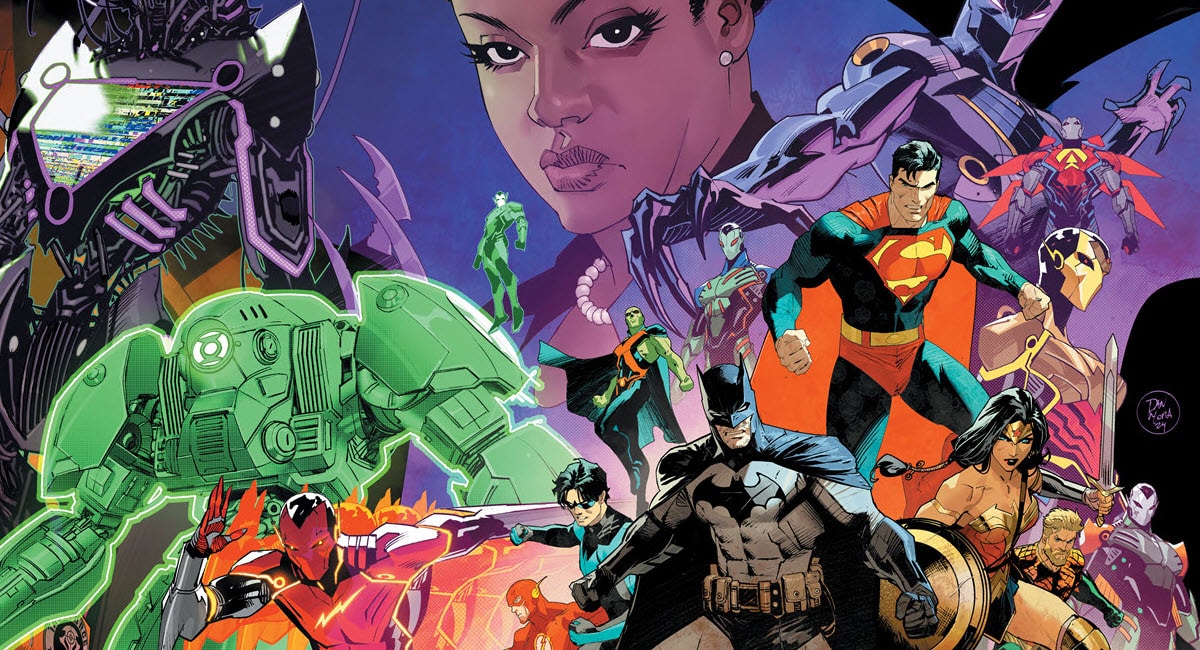
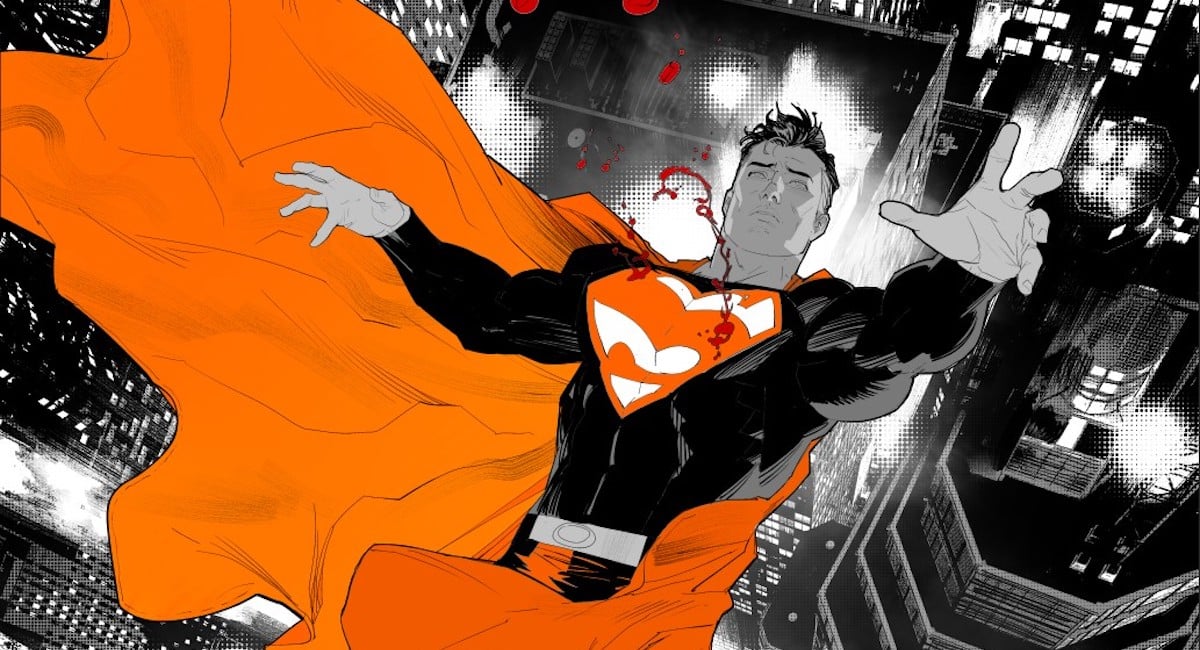





not interested.
Comments are closed.